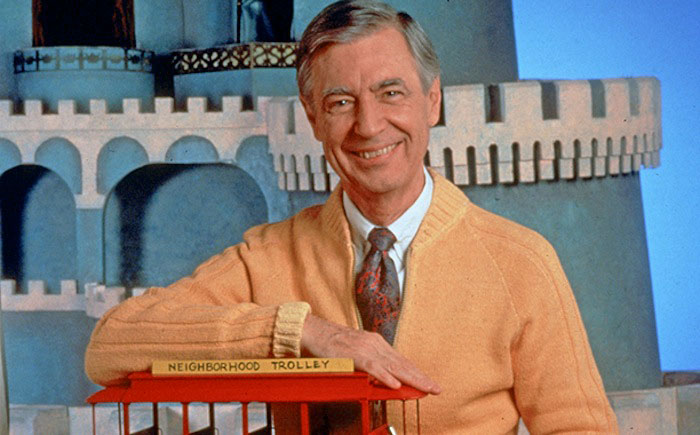From 1968 until 2001, Mister Rogers’ Neighborhood aired on local PBS stations across the country. Each episode, Fred Rogers, the minister turned puppeteer turned songwriter turned activist turned television personality, welcomed us into his home with the warm invitation: “Won’t you be my neighbor?” With his gentle demeanor, he taught us how to face our fears, how to build worlds with our imagination, how to be our authentic selves, how to treat other people with kindness, and how to respect different members of the community.
Fred Rogers understood that each of us is shaped by the people in our lives, in our neighborhoods. He even used his opportunity when receiving the Lifetime Achievement Award at the 1997 Daytime Emmys to encourage the audience to be mindful of those people: “All of us have special ones who have loved us into being. Would you just take, along with me, ten seconds to think of the people who have helped you become who you are?”
Both of us grew up watching Mister Rogers, and as adults, our appreciation of his lessons and legacy has grown, too. We realize that, while many of those people he mentioned who matter most to us are flesh and blood, some of them are characters in books. That’s why we wrote Geek Parenting: to celebrate the fictional relationships that have shaped who we are and how we act toward the people we love. Today, then, we share five fictional families whom we’d love to invite, as Mister Rogers would, to please be our neighbors—to step out of their books and live in our own local “Land of Make-Believe.”
The Hempstocks from The Ocean at the End of the Lane by Neil Gaiman
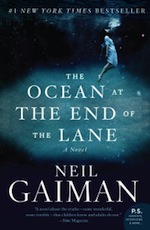 Lettie, Ginnie, and Gran are three generations of Hempstock women living down the lane from the narrator of this novel. The home of these longtime members of the community (several centuries at least) is very much a sanctuary, and they are proficient in all manner of magical arts, from the cellular to the interdimensional levels. Attentive and thoughtful neighbors, the Hempstocks are also amazing cooks. Pancakes with plum jam, porridge with blackberry jam, spotted dick with custard, fresh honeycomb with cream, beef and roast potatoes, and other delectable dishes are a comfort to body and spirit—and would be a welcome addition to block parties and neighborhood potlucks.
Lettie, Ginnie, and Gran are three generations of Hempstock women living down the lane from the narrator of this novel. The home of these longtime members of the community (several centuries at least) is very much a sanctuary, and they are proficient in all manner of magical arts, from the cellular to the interdimensional levels. Attentive and thoughtful neighbors, the Hempstocks are also amazing cooks. Pancakes with plum jam, porridge with blackberry jam, spotted dick with custard, fresh honeycomb with cream, beef and roast potatoes, and other delectable dishes are a comfort to body and spirit—and would be a welcome addition to block parties and neighborhood potlucks.
The Murrys from Madeleine L’Engle’s Time Quintet
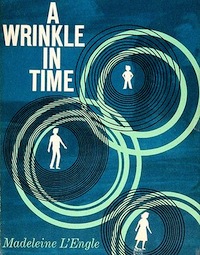 Mister Rogers enjoyed introducing his “television neighbors” to members of the community: He brought us to visit Jane at the dairy farm, Dolly Naranjo at her pottery studio, and Bill Bixby on the set of The Incredible Hulk. It’s easy to imagine him bringing us to the laboratory at the Murrys’ house. “These neighbors have two very important jobs. They are scientists working on tesseracts and farandolae, and they are also a mother and father to four special children: Meg, Charles Wallace, Sandy, and Dennys. Sometimes they make grilled cheese sandwiches; sometimes they travel through time and space to save the universe. It’s important to share the activities we love with the people we love.”
Mister Rogers enjoyed introducing his “television neighbors” to members of the community: He brought us to visit Jane at the dairy farm, Dolly Naranjo at her pottery studio, and Bill Bixby on the set of The Incredible Hulk. It’s easy to imagine him bringing us to the laboratory at the Murrys’ house. “These neighbors have two very important jobs. They are scientists working on tesseracts and farandolae, and they are also a mother and father to four special children: Meg, Charles Wallace, Sandy, and Dennys. Sometimes they make grilled cheese sandwiches; sometimes they travel through time and space to save the universe. It’s important to share the activities we love with the people we love.”
The Celestial Family from Sister Mine by Nalo Hopkinson
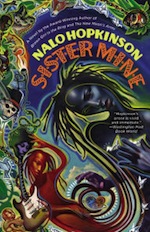 Makeda and Abby are sisters, formerly-conjoined twin daughters of a demi-god dad and a human-turned-sea-creature mom. They experience a healthy dose of sibling rivalry, but are still loyal and loving as they try to track down one sister’s missing magical mojo. Life would never be dull on a block with its own resident pantheon, and Makeda’s bravery and ingenuity in facing down magical threats would be welcome in the face of any neighborhood busybody. And her sister’s supernatural musical ability also makes them the perfect ones to start up a garage band: the Abby Normals, maybe?
Makeda and Abby are sisters, formerly-conjoined twin daughters of a demi-god dad and a human-turned-sea-creature mom. They experience a healthy dose of sibling rivalry, but are still loyal and loving as they try to track down one sister’s missing magical mojo. Life would never be dull on a block with its own resident pantheon, and Makeda’s bravery and ingenuity in facing down magical threats would be welcome in the face of any neighborhood busybody. And her sister’s supernatural musical ability also makes them the perfect ones to start up a garage band: the Abby Normals, maybe?
Aldur’s Brotherhood of Sorcerers from The Belgariad by David Eddings
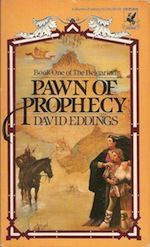 They didn’t start out as a family. But as Belgarath, Beldin and the half-dozen other telekinetic disciples of the benevolent god Aldur realized that they’d been granted lifespans that seemed to approximate immortality, they began to settle in and get comfortable with one another. Belgarath’s daughter Polgara discovered that this patchwork clan of psionic philosopher-mages are kind of the greatest bunch of weird uncles imaginable—at least, for a brainy kid who drops in to ask why why why. They’ll take 80 years at a stretch to study how mountains work, but always make time to share a cup of tea. They’ll pick up some dirt from the ground and conjure it into a birthday present. And they’ve built their own neighborhood of magical towers in a lush, bucolic valley. Never mind inviting them to our block—we want to live on theirs.
They didn’t start out as a family. But as Belgarath, Beldin and the half-dozen other telekinetic disciples of the benevolent god Aldur realized that they’d been granted lifespans that seemed to approximate immortality, they began to settle in and get comfortable with one another. Belgarath’s daughter Polgara discovered that this patchwork clan of psionic philosopher-mages are kind of the greatest bunch of weird uncles imaginable—at least, for a brainy kid who drops in to ask why why why. They’ll take 80 years at a stretch to study how mountains work, but always make time to share a cup of tea. They’ll pick up some dirt from the ground and conjure it into a birthday present. And they’ve built their own neighborhood of magical towers in a lush, bucolic valley. Never mind inviting them to our block—we want to live on theirs.
Denise and Iris from On the Edge of Gone by Corinne Duyvis
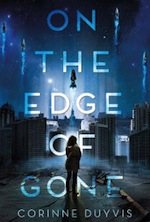 Duyvis may well have been channeling Mister Rogers when she wrote the line, “Whether someone is useful only matters if you value people by their use.” Iris is speaking to her autistic teenage sister, Denise, in the post-comet-stricken Earth of this apocalyptic novel. The sisters and their drug-addicted mother narrowly escape onto a ship that’s scheduled to leave Earth behind to colonize new worlds after a comet strikes the planet—but to stay on the ship, each person must have vital skills that prove their “usefulness.” We’d be happy to have them in our neighborhood regardless, though, because usefulness isn’t what we judge people by. Kindness, creativity, friendship, love: These are the things we want in our neighbors. We want families with different perspectives to enrich the beauty of our make-believe neighborhood. No one’s family, after all, is without flaw or trial—certainly not ours.
Duyvis may well have been channeling Mister Rogers when she wrote the line, “Whether someone is useful only matters if you value people by their use.” Iris is speaking to her autistic teenage sister, Denise, in the post-comet-stricken Earth of this apocalyptic novel. The sisters and their drug-addicted mother narrowly escape onto a ship that’s scheduled to leave Earth behind to colonize new worlds after a comet strikes the planet—but to stay on the ship, each person must have vital skills that prove their “usefulness.” We’d be happy to have them in our neighborhood regardless, though, because usefulness isn’t what we judge people by. Kindness, creativity, friendship, love: These are the things we want in our neighbors. We want families with different perspectives to enrich the beauty of our make-believe neighborhood. No one’s family, after all, is without flaw or trial—certainly not ours.
 Stephen H Segal and Valya Dudycz Lupescu are the co-authors of Geek Parenting: What Joffrey, Jor-El, Maleficent, and the McFlys Teach Us about Raising a Family, available now where books are sold.
Stephen H Segal and Valya Dudycz Lupescu are the co-authors of Geek Parenting: What Joffrey, Jor-El, Maleficent, and the McFlys Teach Us about Raising a Family, available now where books are sold.










